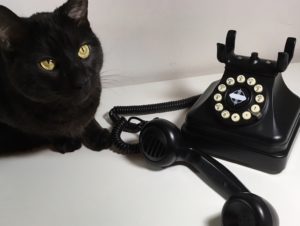
It’s a cold winter day, and the wind is howling. You are at your computer quietly editing a manuscript while sipping your coffee. Maybe you are in a cube at an office surrounded by matching cubes occupied by your colleagues. Maybe you are in your home office with your cat snoozing on your lap. Suddenly, you are startled by a noise. Brring, brring…brrring, brrring. Your cat springs off your lap; you spill your coffee on the keyboard. Gasp, it’s the phone! You look at the caller ID, and it’s an author to whom you recently sent an edited manuscript with many queries. Your heart races. What should you do? Should you answer? Should you pretend you’re not there, curl up in a ball with the cat under your desk, and wait for a voicemail?
I think that many of us at some point in our careers have felt dread when the phone rings. We may fear that an author is going call us to express disapproval or even anger about our edits and want to fight about style. And some of us are so introverted, we don’t like talking on the phone in general. The author call can be daunting, but remember that copy editors and authors have the same goal–to communicate the authors’ research accurately, consistently, clearly, and according to AMA style.
I find that most author phone calls are simply for clarity about the edits or for questions about publication information. However, in some instances, authors will insist on providing their comments on all of the edits over the phone. Communicating more than a few changes over the phone leaves a lot of room for error, can be time consuming, and relies on good note-taking. To avoid this situation, I usually suggest to the author that they provide their edits in an email or a marked-up version of their manuscript to ensure that their edits are accurately incorporated into the document.
On (hopefully) rare occasions, authors will call to express distaste with the edits. My strategy is to be calm, listen, and wait for the author’s exasperation to pass. We may need to negotiate with authors. If they insist on using a term that is contrary to style that I can’t budge on, I offer them a style variation that they want elswehere in the manuscript for which the rules are less strict. But if the author is really disrespectful, I let the appropriate person know. It’s not fair to be belittled for doing our job.
Then there are the authors who enjoy a personal connection and just like to chat. I recently had an author call me and tell me about his chihuahua. I am always up to talk about pets in the midst of reading about medical conditions all day. Even though the call required some time out of my busy day, the author was appreciative of my willingness to chat.
It’s always possible that you will work with an author again in the future, so it’s never a bad idea to establish a cordial, trusting relationship through open communication. So we must take a deep breath, answer that phone, put on our best nice voice, and be ready to cite the AMA Manual of Style.—Sara M. Billings
